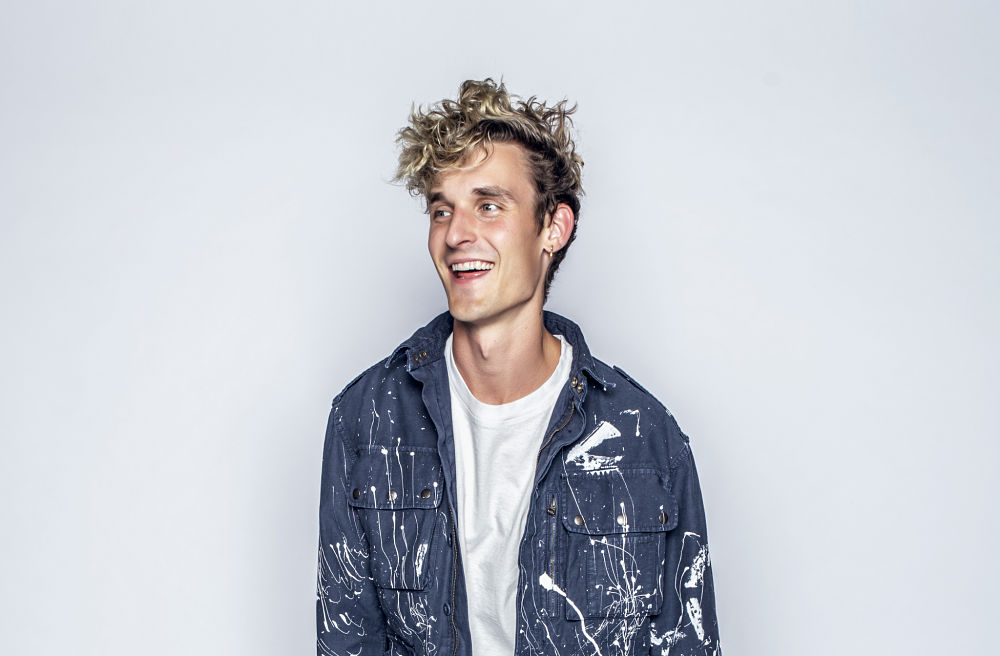Grant Kwiecinski, better known to fans as sax-playin’ bass DJ/producer Griz, seems to have it all figured out. The international headliner has collabs with Snoop Dogg and Bootsy Collins. He plays charity shows each Christmas in Detroit, makes an annual pilgrimage to Thailand, and on “Know Time Like The Present,” the intro track of his latest release Chasing the Golden Hour Pt. 3, he gets real deep, talkin’ about “I’ve stopped trying to try … The universe just is / Being is the answer.”
All that said, Kwiecinski wants you to know, he certainly does not have his “shit together.”
“I’m a mess,” he laughs, “but I’m also not a mess. I’m a multi-faceted being who is balancing. I tip the scales, and then they get tipped back … [I’m] not always balanced and can’t be, because that’s just not how it is for me.”
Chasing the Golden Hour Pt. 3 is not the dharma of an enlightened buddha, but rather the diggable journey of a dude on the path. It’s a jazzy, groove-laden collection of instrumental musings and creative freedom, a more laidback offering than its predecessors that explodes in rainbow beats.
“When I made the first two [mixtapes], I was shooting shots in the dark,” he says. “It was a hodgepodge of softer mood songs, and then it kind of went overboard … I wanted to focus, dig a little bit deeper and have more of a thoughtful approach to the completion of these songs. [Chasing the Golden Hour Pt. 3] had mild rules … because things can turn from zero to dubstep really fast for me.”
Inspired by the cohesive flow of Flying Lotus and Kaytranada, Kwiecinski pushed himself to find a vibe and stick to it. A self-described “spaz,” he wanted to make a mixtape that could soundtrack a scooter ride through the streets of Pai, the sleepy Thai town the producer slipped away into earlier this year.
“As Americans, we can be so objective-based,” he says, “’always do, complete, work harder, assembly line, the more the better, and the quicker the better.’ Thailand is really not like that.”
Pai is where he started writing these songs. It’s also the first place he first heard about COVID-19. That January, refugees from Wuhan were coming to his hotel, and the employees were required to let him know. It still felt like a daydream, something that he could outrun, so he and his friends soon left for Japan, where he recorded the mixtape’s fifth track, “Nights in Shibuya.” The song’s neon romance was inspired by Tokyo’s bustling magic.
The artist was able to complete a tour of Europe before quarantine pinned him at his Denver home, but the intentions he’d set for his creative process proved helpful in the coming months.
“I have made these day-by-day choices that led to an excitement or a joy,” he says. “I make an intention to stretch daily. I make an intention to drink water when I wake up. I make an intention to use social media less. The work isn’t in making that initial decision; it’s making every single decision after that, following your intention and your commitment.”
The pitfall of this passion is escapism. Inspiration is beautiful when it strikes naturally, and an artist’s impulsivity to materialize a vision is an awesome power to behold, but when the security blanket of the studio is used to hide from other personal responsibilities, it becomes a burden.
“If I want to bring joy or happiness into my life, does it become toxic if I’m forcing myself to choose happiness over something that makes me upset?” he asks. “Do I choose dubstep if I want to rage, or do I say ‘let’s chill on that emotion?’ Was that ephemeral, or is that a missed opportunity to make the next amazing thing that’s gonna provide catharsis and lead me through this project? The resolution point is: this moment is infinite. It’s not about what happens next. It’s about what happens now. I’m just gonna make the choice to do whatever is in my heart.”
Kwiecinski applied the same value to the project’s physical production and engineering. Rather than worrying so much on the impossible goal of making the sound “perfect,” he honed in on if it felt good. Techniques were emotionally-driven, drifting away from the rhythm-heavy formulas of traditional dance music style, honing instead on warm chords and soft edges, putting drums behind the melodic tracks, using analog instruments, and so on.
“Can I use my Prophet-6 or my Voyager XL or these Moog synths?” he says. “Can I use my weighted Korg SV1, or run things through Guitar amps? Can I sit there with a joint and just play with a reverb sound and my guitar amp, and run sound through that and collect it with a mic on the other side of the room? [I enjoyed’] the doing of the music in the room at the time, and then put it back through and created some sort of life into it.”
The fuzzy sunset sounds his experimentation begat hits a climax on the secret track “Wish.” Only available on Soundcloud due to an uncleared sample of Sam Cooke’s “I Wish You Love,” the rosy-cheeked cruiser is Kwiecinski’s favorite of the bunch. It’s sentimental and hopeful, like a smile that persists in the face of hardship, exactly the vibe the world could do with more of these days.
“I’m producing with my heart,” he says. “These songs are a reflection of my practice.”





